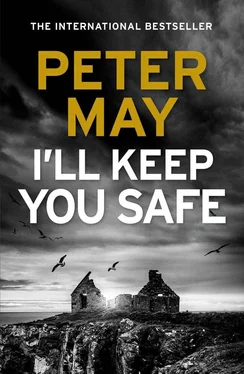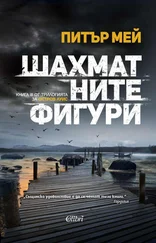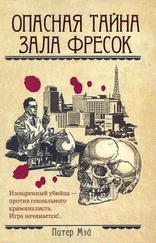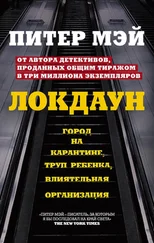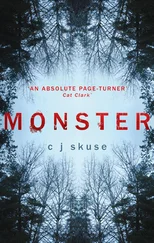She showered quickly, hoping to wash away the fatigue, stepping out to stand on a towel and briskly rubbing herself dry. Another glance in the mirror. Her face pale and unremarkable, the first signs of crow’s feet around her eyes. No time to do anything with her hair. She grabbed the drier and gave it a quick blow-dry then tied it, still damp, in a plain ponytail behind her head. One more glance. The face that looked back at her was severe and unflattering. No time for make-up.
In the bedroom she hauled on the worn brown leather boots that tucked beneath her jeans and dragged on a fresh pull , flicking her ponytail out from the neck at the back. The phone rang as she was slipping into her faithful old leather bomber. She swore softly and grabbed it from the bed. ‘ Oui ?’
‘Hope I didn’t wake you.’ The sarcasm was evident in his tone.
‘No, boss. I’m just on my way out to pick up the girls.’
‘Do it later.’
‘I can’t. My ex has had them all week. I have to get them this morning.’
‘I need you to go down to the Quai de l’Horloge. The guys at the police scientifique have recovered important evidence from bits of the bomb.’
Braque sighed. ‘It’s my day off.’
‘If you want days off, and holidays, and a thirty-five-hour week, then get yourself another job, Braque. You want to be a detective, or a mother? Make a choice.’ His impatience reverberated in her ear. ‘I need a report on my desk this afternoon. The Ministry want this publicly ruled out as terrorism asap.’ He didn’t wait for a response.
Braque closed her eyes. ‘ Putain !’ she breathed into the phone, knowing he was gone. Much as she would have liked to say it to his face, she needed the job and the money. How else could she keep the children?
She speed-dialled her ex, listening to the long, single rings punctuating the rapid beat of her heart.
His voice came, laden with resignation. ‘Tell me.’
‘I’m going to be late, Gilles.’
‘Well, there’s a surprise.’
‘The bomb that went off in the Place de la République last night... you must have heard about it?’
‘And?’
‘I was there.’
Which clearly took him by surprise. A pause. ‘You okay?’
‘Yes. The thing is, I’m on the investigation.’
‘I thought SDAT handled terrorism.’
‘It’s not terrorism. It’s murder. We think.’ She drew in a slow, controlled breath. ‘I’m going to have to pick up the kids tonight.’
His anger was muted, and she guessed that the girls must be within hearing. ‘And if that doesn’t suit me?’
Sylvie had no answer for him. She was entirely at his mercy.
He lowered his voice even further. ‘It’s always at your convenience, isn’t it? Everyone else organizing themselves around you, and your schedule. Do you have any idea how disappointed the girls are going to be?’ She heard the irritation in his breathing. ‘And what if I have to be somewhere else?’
‘Do you?’
Another pause. ‘Some day I will. Then what are you going to do?’
André Duran had been head of the forensics lab ever since Braque could remember. She had thought him old when she first met him nearly fifteen years ago, but he didn’t seem to have aged. Still bald, still grey. His dark, rabbit eyes flickered behind thick-lensed glasses, and he always wore heavy tweed suits beneath his lab coat, whatever the weather.
They had driven out together to the warehouse on the north side of the city where the remains of Irina Vetrov’s car, carefully collected beneath the unforgiving glare of arc lights all through the hours of darkness, were laid out on the concrete floor like an exploded jigsaw puzzle. Tables around brick walls were covered with white paper and littered with large and small fragments of the debris. Forensic scientists in white coats were examining and labelling every piece.
In the car, Duran told her they had lifted a fingerprint from the remains of the bomb casing. ‘Normally, heat will obliterate any fingerprints,’ he said. ‘At least, those that we can identify by conventional means.’ He grinned mischievously. ‘That’s what the bomb-makers believe, too. So they are careless. They don’t bother about leaving prints on their handiwork. What they don’t know — yet — is that we have new ways of retrieving them.’
Now, in the cold bright light of the warehouse, he gave her latex gloves and took her to the table where all the pieces of the bomb had been gathered. Braque was amazed that so much of it had remained intact, although none of the pieces of charred and mangled metal, lengths of wire and melted plastic strewn across the white paper would have identified themselves to her untrained eye as bits of a bomb.
‘It’s a professional job,’ Duran said. ‘It doesn’t take too much explosive to make a bit of a mess, especially when you have a tank full of petrol to accelerate it.’ He handed Braque a blackened piece of curved metal. ‘All packed into a steel holder with the upper half cut away to encourage the blast upwards. Simple but effective. Attached with magnets to the underside of the vehicle. Probably took less than thirty seconds to place it. Very often a tilt fuse, or mercury switch, is used. Mercury at one end of a glass or plastic tube, the other wired with the ends of an open circuit to an electrical firing system. The movement of a car as it accelerates would send the mercury down the tube to complete the circuit, and boom! But that’s a very inexact science if you are wanting to choose the exact moment of detonation. If a tilt fuse had been fitted to this one it would have gone off long before Vetrov reached the hotel.’
‘So it was detonated by remote control.’
‘Exactly. Whoever placed the bomb wanted to be sure that both of the intended victims were in the car when it went off.’
‘Which means he was in the square.’
‘Had to have been.’
‘And he used a phone.’
‘That was our original assessment. Confirmed now by the pieces of mobile phone that have been recovered from the site.’ He nodded towards a table further along the wall. ‘Actually, the remains of the sim card itself. Untraceable, I’m afraid.’
‘And the fingerprint?’
Duran lifted a shard of metal which had been polished clean. The tattoo of a very fine fingerprint clearly visible on it. ‘This is just one piece. One print. I’m sure we are going to recover many more.’
‘How?’ Braque was curious.
Duran peeled off a glove and took the tip of one of his fingers between the thumb and forefinger of his other hand. ‘The sweat on our fingertips,’ he said, ‘comprises a mix of water, sodium chloride and various other oily substances. It has an almost imperceptible corrosive effect on metal. While the heat of a bomb blast would normally destroy surface fingerprints, it actually increases the corrosive effect of the sweat residue, effectively engraving the print invisibly into the metal.’ He chuckled. ‘All these years we believed that bullets and bomb fragments were fingerprint-free, when they were there, right under our noses, the whole time.’
‘So how do you know when there’s a fingerprint there?’
Duran shrugged. ‘It’s a very simple process, Lieutenant, and amazing it took us so long to discover it. You apply a powerful electrostatic charge to the piece you are examining, and dust it with a fine carbon powder. The carbon particles cling to the areas of metal corroded by the sweat of a finger, et voilà , you have a perfectly readable print.’
Braque picked up and examined the print on the piece of metal. ‘And do we know whose it is?’
Duran pulled a face. ‘Afraid not.’ He paused. ‘But it’s not unknown to us. We, and others in Europe and the Middle East, have pulled this one’s prints off multiple explosive devices over the last couple of years. What do we know about him? Nothing. Except that he’s a pro. Effectively a gun for hire. Terrorists, criminals, anyone who wants a professional, reliable bomb-maker would go to him, or someone like him.’
Читать дальше
